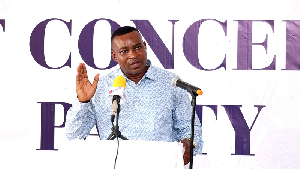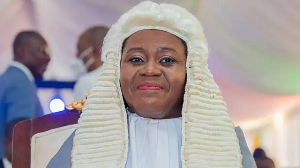FOOD FOR THORUGHT
Even more so, perhaps, purposive agency exists only in a virtual community descriptive of the doctrinaire absolutism of wolfish kleptocrats and political idealists. This virtual community harbors the likes of Mr. Alfred Agbesi Woyome, a self-styled financier of the ruling party, and several others like him but who, among other things, appear on both sides of the political aisle. Lawyers affiliated with the ruling party and at the same involved in the teeming scandals of judgment debts share in this virtual community as well. Talk of the political existence of tripartite bureaucratic independence within the democratic infrastructure of governance is therefore sheer nonsense.
In sum, beliefs based on partisan ideology; graft and lobbying and special interest/interest group politics; human fallibility; corporate statism; official neglect of conflict of interest; political patronage; bureaucratic interdependence (among the three branches of government); hyperdemocracy; nepotism and cronyism and other forms of political favoritisms; official personal and collective sympathies for the political philosophy which executive authority represents can all work in tandem to frustrate the interdependent tripartite bureaucratization of government from materialization. The assignation of independence to the three branches of government, thus, falls short of its practical implications and bureaucratic applications.
It is in this context that the culture of impunity and political corruption assume sacred niches in our popular culture. The two eventually give birth to moral atrophy, while political corruption in particular becomes a silent killer of the corporate body politic of Ghana. The individuating clades of persons are thereby consumed by the acidifying amorality of groupthink, of which our vulgar popular culture, pervasiveness of corruption, social and political sanctimony, and public apathy represent. The tendency of incumbency to dish out selective benefits during electioneering campaigns and on election days are all part of the problem.
And as we said before, the absence of teachable precedents for dealing effectively with corrupt public officials means that the engine of political corruption and the mechanics of impunity assume interlocking motions of endless circularity in the body politic. By teachable precedents we are not, for instance, referring to the Kufuor Administration’s politically tainted hounding of certain members of the political party of his predecessor. Kufuor may have done so to please Western donors and to give them the assurance that his government was not going to tolerate political corruption. Unfortunately the behavior of his government proved otherwise, perhaps also one of the many reasons his government lost out on the prestigious Ibrahim Prize.
At this point in time the citizenry and its leadership stand at a crossroads in this clueless dispensation of dubious democratic practice in the advent of the Fourth Republic.
OTHER MATTERS
This afore-described Orwellian constitutional arrangement works to the comparative advantage of the executive presidency. This is also why some believe legislative presidency is superior to the executive presidency. This assertion is beyond the point. Official corruption is a true reflection of the larger society among which potential kleptocrats reside. Public apathy also fuels it to a certain degree of social acceptation, perhaps because the Ghanaian electorate does not exercise its franchise according to the practical norms of competence voting. Prospective voting or retrospective voting does not feature in the political charactology of the electorate. Electoral fraud, social engineering, false consensus, absence of patriotism, possible lack of rational cost-benefit analysis in voting choices of the electorate, and elite opinion can negatively impact the moral agency of the elective franchise.
This is why Anas’ journalistic investigation of and sting operation covering the Ghanaian parliament could have served an instrumental purpose in understanding the nature and extent of legislative corruption. But Anas himself and his investigative outfit have been tagged corrupt in the informed yet controversial view of Martin Amidu, a perception we reckon should have at least attracted the forensic investigation of the National Bureau of Investigations (BNI) and the Criminal Investigations Department (CID). These institutions are themselves compromised in that even pursuit of virtual independence from the political establishment is impossible. This is serious problem.
The leadership of both institutions have therefore become malleable androids, subject to intermittent political manipulation in the rising kleptocratic temperature of the political establishment, at politicians’ convenience or discretion. The seriousness of Anas’ and Amidu’s investigative revelations should have been their [BNI’s and CID’s] primary assignments, not the other way around. This is not to say private citizens cannot bring public attention to political corruption if this is done within the parameters of correct constitutional interpretation and application. Or that private citizens cannot file amicus curiae briefs in behalf of the public interest, including such activities as petitioning the Supreme Court for redress in defense or pursuit of the public good and the constitutional limitations of the executive presidency.
An unfortunate aspect to the pursuit of these lines of argument are the calculated politically imposed interpositions of bureaucratic corruption in the moral acts of private citizens in the public and national interest. The politically untoward behaviors of useful idiots and serial callers may undermine the public good, particularly in situations where civil courage and public opinion clash with or challenge the self-aggrandizing excesses of the executive presidency, financial gratifications from judicial masturbation, and parliamentary apathy toward political corruption. This may also happen when there is lack of equality of opportunity for those in opposition who may not have access to the material benefits the executive presidency and its political financiers and partisan foot soldiers enjoy, to the detriment of national development.
There is more we can all do to help our crippling country get back on its feet as the progressive vision and teachable leadership of Nkrumah left it at the time of the putschism that overthrew his government.
CONSIDER THIS
It is our view that the authors of our national Constitution should have made the Council of State a constitutive institution rather than an advisory one. That is, they should have shifted the advisory institution to a constitutive body whose internal constitution should have been framed in a fashion more reflective of the diverse ideological spectrum of Ghanaian society. On the one hand, this helps the executive presidency in many interesting aspects because it relies on the framological variables of political patronage and ideological conformity of the constitution of the Council of State to bend the latter institution to its whims and caprices. Finally, the Council of State should be more than an institutional rubber stamp just as the legislature should be more than a toy parliament. In this particular instance therefore, the constitutive authority of the Council of State we are proposing should be a direct derivative of consensus democracy.
Otherwise, the Council of State should be dissolved. That being said, we have no objections to the constitution of the Council of State being made up of 50 percent of persons chosen by and from opposition parties. The Council of State should be a rainbow coalition of sorts. The reason for this is obvious. Still, in our conceptual framology we want to see avoidance of functional duplications and overlaps between the Council of State and other constitutive bodies as necessary bureaucratic prompts for constitutive efficiency, cost reduction, and operational autonomy. It may be helpful if civic education (civics) for Ghanaian youth addresses itself to these larger questions of Social Studies. Civics, as we may all know, is important to the proper functioning of society as it exposes citizens to politics, governance, patriotism, economics, and social stability among others. The National Commission for Civic Education (NCCE) should do more in this regard.
The Judicial Council and the General Legal Council, likewise, have a responsibility to educate the public on the proper roles and functioning of the judiciary, jurisprudence, and law in society and democratic governance. To reduce judicial corruption, however, we may suggest that district court judges, for instance, be subjected to election referendum, also called judicial retention election, when Ghanaians go to the polls to elect their parliamentarians and president. The General Legal Council, the Judicial Council, and the NCCE can moderate public debates on this policy recommendation.
It is however not clear if the larger public familiarizes itself with justices’ and judges’ written opinions on adjudicated cases, as well as whether constituencies familiarize themselves with the voting patterns of their sitting parliamentary representatives. Sadly, the parliamentary system we have in place today is useless and only good for personal enrichment and cheap talk. It is an insane asylum where intellectually-lazy political pseudo-patients gather to trade psychotic banter, elitist empty talk, and institutional insults, all at the expense of the rational projection of national priorities in matters of development economics and political economy.
One is not too sure if Ghanaians may prefer parliamentary democracy to presidential democracy, as the former makes very good use of coalition governance in which strategic cooperation among various political parties neutralizes or minimizes the emergence of executive dominance, a view similar to our proposed Council of State. The sheer number of parliamentarians constitutes a considerable drain on the Consolidated Fund and one wonders if that number could be reduced. This borrowed concept of gerrymandering has a considerable cost or financial component to it that has never been probably brought to public attention or properly explained to the masses. All these exert unnecessary strain on the Consolidated Fund and more importantly, provoke unwarranted political and social tensions in Ghana’s duopolistic culture. We would have therefore wished if a moratorium were imposed on parliamentary activities or that parliament were dissolved indefinitely pending the discovery of a better or more effective replacement for it. This requires considerable resources.
However like the parliament, the judiciary is no better in terms of the discharge of justice. It is an antiquated village farmhouse, barn, and outhouse where tired, crude farmhands calling themselves jurists trade Kweku Ananse verdicts and judgements for bleating castrated goats, asteroidal tubers of yam, and romantic massage therapies, while at the same setting hardened criminals free and sending the innocent to prison because they are poor, powerless, and politically unconnected. There is so much to do in order to reform these compartments of government. Where exactly do we begin? This question gives an appearance of a silly paradox reflective of discursive cues that border on a simplistic convolution of the obvious, which is another way of calling for sustained conscientization of public psychology against moral atrophy and nominalist rejection of the material ontology of mortal fallibility. It is a complex question nonetheless. And “where” begins our interrogation of society.
Let us add that critical theory has everything to do with, our interrogation of society. It could help a great deal in advancing the cause of public education as it relates to acquisition of civic knowledge if judicial and parliamentary deliberations are televised nationally. We are talking about the expansion of viewership and listenership for theoretical and practical knowledge of jurisprudence in the public domain. The only possible downside to this policy submission could be that citizens are too busy trying to put their lives together in this dispensation of economic apocalypse, moral atrophy, civilizational vulgarity, moral turpitude, and universalized orchestration of social jihadism through political corruption, to such an extent as to care about the abstruse lingoes and intellectual banality of parliamentary and judicial deliberations.
Nevertheless all things considered, we need to give serious thought to questions of making critical pedagogy and andragogy (adult education) part of the social infrastructure of collection action with regard to the critical and patriotic consciousness of citizens. We mention andragogy specifically because acquisition of civic education and literacy should not be the privileged niche of Ghanaian youth alone. There is therefore an imperative need to bridge the generational gap in the acquisition of modern knowledge between the two age groups. Also, universal acquisitional facilitation of Information & Communications Technology (ICT) is necessary for effective realization of our policy objectives.
We shall return…
Opinions of Tuesday, 26 January 2016
Columnist: Kwarteng, Francis














